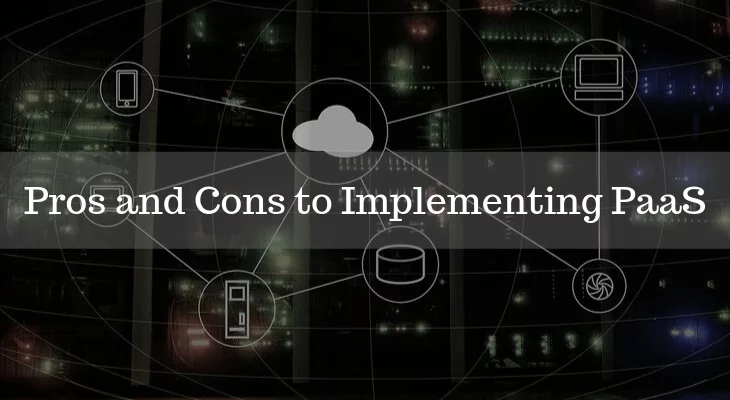For different organizations, some projects can be demanding in terms of the investment that is required to run the process.
In there, cost-cutting can't be an option as that would mean, compromising on the quality of product/service. In this situation, implementing Platform-as-a-Service (PaaS) model could be a great option for you.
PaaS is a type of cloud computing and in the cloud computing hierarchy it comes right between SaaS and IaaS, under which a service provider or third party offers a platform to the user with suitable resources like hardware, software tools, storage infrastructure, etc.
If you are implementing PaaS, it doesn’t mean you are replacing your IT infrastructure. Instead, your business relies on PaaS providers as they are giving you a platform and environment with all the necessary tools.
In this model, the user can focus more on the creation and testing of applications rather than maintaining and building the new infrastructure for the project from scratch. Some of the top PaaS providers are as follows:
- Amazon Web Services (AWS)
- Elastic Beanstalk
- Oracle Cloud Platform (OCP)
- Google App Engine
- Microsoft Azure
- Salesforce PaaS
- OpenShift
- IBM Cloud platform
- SAP Cloud Platform
- Engine Yard
Let’s have a look at some prime pros of PaaS which will take your business to new heights.
PaaS provides you a priceless opportunity to decrease your overheads.
Despite having a limited budget, PaaS can help you to perform at your maximum capabilities without worrying about infrastructure, physical resources, new tools, and equipment, etc.
As it is, provided by your PaaS vendor for your project on a single platform.
PaaS platform comes with pre-coded applications, which are already installed in the tools of your preference.
So while coding you don’t need to start from the beginning. It will provide you with features like directories, workflows, security, search, and many more.
This will help a developer to complete the given task without any delay.
Every software development cycle goes through different phases, from the inception to the implementation phase and finally to mass roll-outs.
Earlier, in every phase, a mass team was required to finish their respective tasks.
However, after PaaS implementation, you don’t need a massive team to perform tasks, because PaaS itself equals to a big team. Under one roof, a group of people can perform multiple tasks.
Implementation and testing phase are the ones, which require more cost than usual because during this period your client could ask for edits and more features.
This will require more effort and development of new tools to meet the client requirements, but if you go through PaaS you will only need to pay for “What you need.”
PaaS pricing models completely depends upon your needs and requirements.
PaaS provides you many more options in development than usual software development.
An end product could only be better if it is built by the latest version of supporting software. In the case of PaaS, you will get the latest version automatically in your kit but in the traditional method, you’ll have to purchase the latest version which could be costly.
PaaS also provides remote access over the internet which is a highly useful feature for your team and for your client as well.
Along with this, you will also get the database, IoT, master data management, business process management, backup facility, etc.
But these features completely depend upon your PaaS package. Some providers allow all facilities under one master plan and some do not.
But with all these above features PaaS also has some cons. Let’s try to understand those
Also Read: Top Five Difference between Iaas & PaaS
For the development of almost every software, “data is a must.” This data could be anything from previous logs to software development flows or architectural flow.
While working on PaaS, there is a concern of data security as PaaS is handled by third-party organizers. These services are controlled by one or many vendors so data leakage becomes a concern.
Every PaaS vendor has its unique compatibility and integration process. If in the middle of the project, you find any problem with integration and you decide to change your PaaS vendor, then that is not easy.
There is no doubt that when two different solutions integrate with each other, some difficulties and contradictions may arise. This is a very common failure in PaaS during integration.
If a PaaS provider decides to opt for some changes in their current architecture, then that could be a big problem for you.
Suppose, you are working on PHP language which is compatible with your PaaS solution and then in the middle of your project, your PaaS vendor comes up with a new update, which requires Java language for further compatibility.
This situation could leave you with two options, either you can change your programming language or that you can change your PaaS provider.
Conclusion
Since its inception, PaaS has given many wonderful opportunities to small scale enterprises, which are not capable to build their own infrastructure.
Implementation of PaaS could be a real turn around for your business but it comes with its own share of advantages as well as disadvantages.
Where many of the current users of PaaS are happy with its performance but there are some users who’ve raised some concerns.
It completely depends upon your business flow and software development architecture to decide whether to go with PaaS or not. So choose wisely.
Also Read: CaaS vs. PaaS: Understand the Difference





